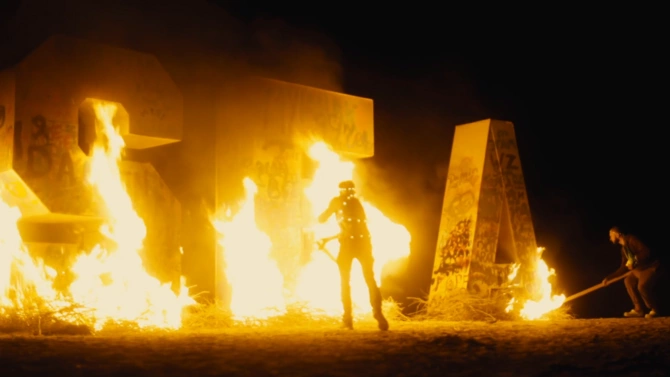
Last weekend experimental techno music fans in Uzbekistan became champions for publicizing one of the world’s most dire ecological catastrophes. How? Simply by attending the ultra-remote Stiha Festival.
Image: courtesy photo
The Aral Sea was once the world’s fourth-largest lake. However, in recent decades it has dried to a fraction of its former size, becoming one of the world’s worst environmental catastrophes. Where there were once shoals of fish, now the vast majority of the water has evaporated altogether. Former fishing boats lie as rusting hulks on the former lake-bed.

Image: courtesy photo
The former port of Muynak[1] in remote northwestern Uzbekistan is now surrounded by desert, many miles from the shore of what’s left of the Aral. It attracts a few ‘disaster tourists’ wanting to Instagram the sorry sight of its trawler graveyard. The town is a witness to the economic hardships caused by the lake’s desiccation – an entirely man-made disaster caused by decades of excessively overusing upstream river water to irrigate cotton crops.

A publicity shot for Stihia’s 2018 edition. Image: courtesy photo
However, since 2017, Moynak is also home to one of the most remarkable and offbeat manifestations of Central Asia’s new ‘street culture’ exuberance. Tashkent lawyer Otabek Suleimanov co-founded the extraordinary Stihia Festival to draw attention to the continuing ecological nightmare. It is quite possibly the world’s remotest festival of techno music and electronica. When it started, it was described as a “litmus test for one of the world's youngest club scenes.” The festival was also the focus of George Itzakh’s 2020 documentary,


Image: courtesy photo
The fourth edition of the festival in 2022 has proved the biggest yet, bringing over 30 artists to two stages on the long weekend of May 6 to 8.

Image: courtesy photo
Up-and-coming acts from Uzbekistan were given a great showcase alongside far more established international acts, including Japanese techno-wizard





Image: courtesy photo
Genres have also been expanded to add progressive house, ambient, and ethnic music to the electronic, acid and techno mix.

Image: courtesy photo
Around 1200 fans converged on the festival site with yurts and tents placed around a long-redundant lighthouse that sits beside the former shore of the now absent Aral. Many locals, some slightly bemused, have been getting into the swing of things too.

Image: courtesy photo
As well as the music, there’s a highly important “Stihia N+1 forum,” a TED-like series of talks and discussions that naturally include sustainability and environmental conservation topics but also deal with other pressing issues of humanity, including urban planning and the impact of tourism.

Image: courtesy photo
But more than anything, one of the critical points of having this remote festival is to remind the world that the Aral Sea problem hasn’t gone away and that global warming is not the only way human mismanagement of the ecosystem is having serious negative effects.

Image: courtesy photo
As Otabek Suleimanov puts it, "Environmental catastrophe isn't a fairy tale. We want to say that if you think man cannot affect the ecosystem, you're wrong."

Image: courtesy photo
Perhaps with a nod to Burning Man, proceedings in the past have culminated with the ceremonial setting alight of the word ‘SEA’ spelled in giant letters. It is a none too subtle way to underline the point that human arrogance really can destroy whole ecosystems.

Image: Waiting for the Sea /Vimeo Frame
This year the burning didn’t occur. Instead, nature spoke for itself, hitting the festival with dust storms, lightning and rain: clear evidence of local climate distortions, themselves caused by the shrinking of the Aral Sea.
[1] Also spelled Mo’ynak
[2] Not to be confused with the 2012 feature film about a mad Aral Sea fisherman, also called

Share on social media